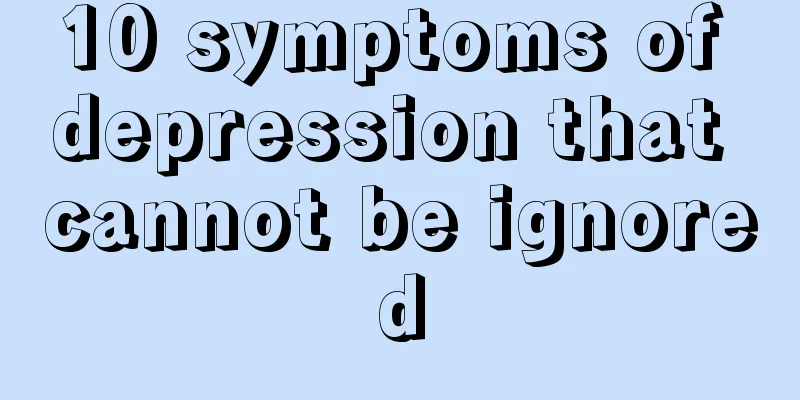10 symptoms of depression that cannot be ignored

|
1. Depression can range from mild bad mood to sadness, pessimism, and despair: The patient feels heavy-hearted, life is meaningless, he cannot be happy, he is depressed, his days are long like years, he is in unbearable pain and cannot extricate himself. Some patients may also experience anxiety, irritability, and nervousness. 2. Loss of interest is one of the common symptoms of depression: Loss of enthusiasm and pleasure in previous life and work, and loss of interest in everything. They are unable to experience the joy of family life, are indifferent to their previous hobbies, often live alone, alienate themselves from relatives and friends, and avoid socializing. Patients often complain of "no emotions", "emotional numbness", and "can't be happy anymore". 3. Loss of energy, fatigue, difficulty in washing, dressing and other daily chores, and inability to do them: Patients often use terms like "mental breakdown" or "deflated ball" to describe their condition. 4. Low self-evaluation: Patients tend to excessively belittle their own abilities, and view their present, past and future with a critical, negative and negative attitude. They think this is not good and that is not right, and they describe themselves as worthless and their future as bleak. Strong sense of self-blame, guilt, uselessness, worthlessness, and helplessness. In severe cases, self-blame and hypochondriasis may occur. 5. The patient is in a state of marked, persistent, and widespread depression: Difficulty concentrating, memory loss, slow thinking, blocked thinking, slow movements, but some patients show restlessness, anxiety, tension and agitation. 6. Negative and pessimistic: They are extremely painful, pessimistic, and desperate inside, feeling that life is a burden and not worth lingering on, and seek relief through death, which may lead to strong suicidal thoughts and behaviors. 7. Physical or biological symptoms: Depressed patients often have biological symptoms such as loss of appetite, weight loss, sleep disorders, sexual dysfunction and diurnal mood fluctuations. These symptoms are very common, but not present in every case. 8. Loss of appetite and weight loss: Most patients have symptoms of loss of appetite and poor digestion. Delicious food is no longer tempting. Patients have no appetite or find food tasteless, often accompanied by weight loss. 9. Sexual dysfunction: Decreased libido may occur in the early stages of the disease, men may suffer from impotence, and female patients may experience loss of sexual desire. 10. Others: Hallucinations, depersonalization, derealization, obsessive-compulsive and phobic symptoms may also occur during depressive episodes. Due to the significant slowdown of thought association and memory decline, the cognitive function of elderly patients can be easily affected, resulting in depressive pseudo-alzheimer's disease. |
<<: 6 tips for teeth whitening to make your smile brighter
>>: 8 small actions in the morning to keep you in good condition for the whole day
Recommend
How is breast cancer caused
Breast cancer is a malignant tumor that occurs in...
What medicine is effective for liver cysts
In our lives, there are still many patients suffe...
The dangers of dropping essential oil on the belly button
Everyone loves beauty. Some people think that dro...
What methods can be used to prolong life for lymphoma
Immune factors are one of the important causes of...
What are the treatments and care for dyspnea caused by goiter
In today's social life, we face more and more...
What is a hamartoma
Hamartoma is a tumor-like deformity formed during...
How to cry in 3 seconds?
For actors, many people can easily make themselve...
I don't urinate much but I can't hold it in urgently
As the pressure in real life continues to increas...
Analysis of the current status of glioma treatment methods
What is glioma? Perhaps many people are not very ...
Different treatments for different stages of colorectal cancer
Intestinal cancer seriously threatens the health ...
What are the high-risk groups for prostate cancer?
Although prostate cancer generally does not occur...
Can wontons be frozen in the refrigerator?
If you buy too many wontons and cannot finish the...
Ovarian tumor causes ascites
Ovarian tumor causing ascites Patients with ovari...
How to treat acne on cheeks?
Acne is a common skin problem for many people. Ac...
What is the reason for peeling face
Facial peeling occurs in winter, which is related...









